De Estische dichter, schrijver en vertaler Tõnu Õnnepalu werd geboren op 13 september 1962 in Tallin. Zie ook mijn blog van 13 september 2008 en ook mijn blog van 13 september 2009 en ook mijn blog van 13 september 2010.
Flesh has become word
Flesh has become word, word has not become flesh.
Who lives, can become word,
this is my little human hope
and today it is visible, today, today!
Today awakens the flesh in my flesh and the earth in my bones
and the sap of trees, the earth water, rises upwards,
earth’s cold blind water, lifeless water, ice water,
presses up throught the veins,
through the bitter flesh of pines,
the sweet flesh of maples,
up, out, into steam, as spirit,
in vain, water presses, sap presses, blood presses, yes,
not listening, in vain!
The hum of ducks is the Victory Song today,
the Nameless’ immense fleshly voice in the tranquil mist of the sea,
under the bright morning covers, in the warm, wordless light,
yes, in wordlessness, in not becoming word, in not being held by the word.
And I remain outside of it, outside of this great day,
because inside me there are words,
seeing and hearing I think words,
I do not hum like ducks, I do not flap wings,
the words in my head are mute motionless song,
needless sounds that nobody hears,
blind light that nobody sees,
an unmade move, caress and pain that nobody feels.
But there is something else in me, there happens to be everything
that touches everything else today and flies away.
And the word is smaller than this,
for really there is very little in word.
Perhaps this or that, perhaps a lot,
perhaps almost everything remains outside the word.
The word is ill of it, always in pain for what it is not.
In pain of this morning,
in pain of the flesh and blood,
in pain of water and light,
in pain for being closed in the head.
It may be that this is my work, that this is
the pressing voice of the Nameless speaking in me:
to let the word free, let it out of the head,
let it die, sow it into the vast earth of the unword,
into the darkness of myself and un-self,
outside the gates into the great light where Today is waiting,
where the wordless, shapeless, ever changing All is waiting.
And I myself should wait, not knowing for what,
cry and mourn for the word, weep for my self
that has no more name,
lie down on bare ground before the Gates
as beggars lie down to sleep in the open
and wait to be let in,
wait to get out,
wait for the Hour of Change, for the Unknown.

Tõnu Õnnepalu (Tallin, 13 september 1962)
De Poolse schrijver Janusz Glowacki werd geboren op 13 september 1938 in Poznań. Zie ook mijn blog van 13 september 2010.
Uit: Aus dem Kopf (Vertaald doorHeinz Rosenau)
„Zu Beginn schien es, als käme ich damit genau hin.
Ich wohnte umsonst im Holiday Inn Hotel und hatte sogar noch zusätzliche Einkünfte, da man mich für meine Besuche bei den Proben – anders als in Polen, wo man Autoren nur widerwillig ins Theater lässt – bezahlte. Die Schauspieler waren tadellos, der Regisseur Danny Boyle, der aus Trainspotting, auch. Bereits nach der ersten Probe war ich überzeugt, dass Cinders, anders als Aschenkinder, nach dessen polnischer Aufführung ich mir geschworen hatte, nie wieder für das Theater zu schreiben, ein richtig gutes Stück war. Und die drei polnischen Konsuln in London, Herr Kopa, Herr Słomka und Herr Mucha hatten sogar im Theater anrufen lassen und sich für die Premierenfeier angekündigt. Ich fühlte mich geschmeichelt, denn bis zu diesem Zeitpunkt kannte ich nur einen einzigen polnischen Diplomaten (und zudem einen ehemaligen), nämlich den Konsul in Glasgow. Seine schwache Seite war ein völliger Mangel an Fremdsprachenkenntnissen. Seine starke eine gut aussehende Ehefrau, eine Schauspielerin. Ihretwegen verbrachte der Herr Konsul seine Urlaube im Warschauer SPATiF, dem Restaurant des polnischen Schauspielerverbandes, und nach ein paar Schnäpsen war er gerne bereit seine Zuhörer am diplomatischen Leben teilhaben zu lassen. Der Job – sagte er – sei im Grunde ganz angenehm, nur leider komme alle naselang irgendein Engländer angewackelt und wolle irgendwas von ihm. Das wäre ja auch gar nicht so schlimm, wenn er wenigstens verstehen könnte, was der Mann da erzählte.
Abends nach den Proben ging ich mit den Schauspielern auf ein Guinness in eine der Kneipen auf dem Sloan Square. Jaruzelski und Breschnew, Wałęsa, Kuroń und Michnik waren immer weiter weg, ich war mächtig stolz und wartete geduldig auf die Premiere.“
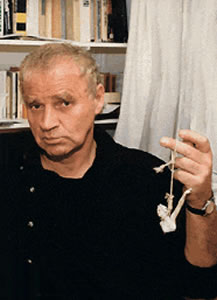
Janusz Glowacki (Poznań, 13 september 1938)
De Poolse dichter Julian Tuwim werd geboren in Łódź op 13 september 1894. Zie ook mijn blog van 13 september 2010 en eveneens alle tags voor Julian Tuwim op dit blog.
Grass
Grass, grass up to my knees!
Grow up to the sky
So that there won’t seem to be
Any you or I
So that I will turn all green
And blossom to my bones,
So that my words won’t come between
Your freshness and my own.
So that for the two of us
There will be one name:
Either for both of us – grass,
Or both both of us – tuwim.
Wife
My husband is idle, is dumb and spends money.
He either stands still at the window or runs about town like a bunny.
He stares and he stares, at a tram, at the sky.
He mutters, he whistles: he rummages over the house like an amateur spy.
And then he reads books: he turns their pages at least.
There are books in the kitchen and cellar; folios mixed with the yeast.
But what is he thinking about? what does my husband mumble?
When he tries to speak he gets nervous: piles of words flurry and tumble.
In the evening he drinks, and I feel angry enough
When I see his dear eyes getting misted up with that stuff.
His eyes are misted. He takes one more dram.
He kneels down beside me and lays his head on my arm.
It is only then that I learn for the first time who I am.
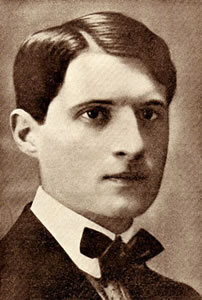
Julian Tuwim (13 september 1894 – 27 december 1953)
De Duitstalige, Roemeense, schrijver en pastor Eginald Schlattner werd geboren in Arad op 13 september 1933. Zie ook mijn blog van 13 september 2010.
Uit: Das Klavier im Nebel
“Die Tante in Bukarest, böse wie das Feuer, zeigte sich von der besten Seite. Sie entfaltete ihren ganzen Charme, was den Onkel ungerührt ließ, Rodica gleichgültig war, Clemens aber Eindruck machte.
Es war der Onkel, der Rodica in Schäßburg gezwungen hatte, die Fahrt ans Meer mit Clemens abzusagen. Die Befehle seiner Frau führte er ebenso dienstwillig aus wie die Befehle seines Ministers, selbst wenn sie forderte, daß er ihr die Hände bis zum Ellbogen küßte und zurück bis zu den Fingerspitzen, was er ohne Murren tat, nicht anders, als handle es sich um Schädlingsbekämpfung. Er schwieg zu allem.
Doamna Aurora Ingrid war klein von Gestalt, sie trug hochhackige Schuhe, so daß der Fuß steil abwärts wies. Die große Zehe stand vorne heraus, scharlachrot touchiert, und scharlachrot waren die krallenhaften Fingernägel. “Weißt du, warum die Fingernägel so lang sind?” flüsterte Rodica. “Sie will damit beweisen, daß sie eine Intellektuelle ist. Mit solch schrecklichen Krallen kann man keine grobe Arbeit verrichten. Huh. Und die Kinder kriegen die Fraisen.”
Die Gastgeberin trug nur rot. Ein Rausch in Rot. Die leichtfüßige Figur war umweht von Gewändern in Abwandlungen von Purpur bis Rosa. Ihr Haar war schwarz mit silbernen Strähnen. “Sie wird grau. Nun hat sie einige Strähnen silbrig gefärbt, damit man denkt, es sei eine modische Marotte.”
“Mit Ofensilber”, pflichtete Clemens bei. Sie verstanden sich wieder wie einst. Am Abend, wenn sie sich über die Eindrücke des Tages austauschten, fiel beiden meist dasselbe ein.
Die Gemächer des Hauses hatte man in Socken zu betreten. Im Flur standen die Schuhe des Hausherrn in Reih und Glied. Die puppenhaften Schuhe der Dame lagen wahllos herum, so wie sie ihr von den Füßen gepurzelt waren.“
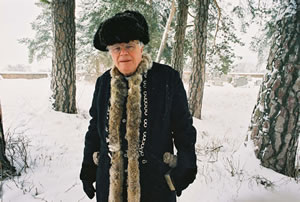
Eginald Schlattner (Arad, 13 september 1933)
De Amerikaanse schrijver, journalist en scenarist Warren Murphy werd geboren op 13 september 1933 in Jersey City, New Jersey. Zie ook mijn blog van 13 september 2010.
Uit: The Destroyer (Samen met Richard Sapir)
„Dr. Daniel Demmet was a true professional. When he decided it was time to kill his patient, he first made sure that the critical body functions were doing well. He checked the electrocardiogram screen, as he had been checking it since the patient had been wheeled into the operating room of the Robler Clinic, one of the finer hospitals just outside of Baltimore. Dr. Demmet sat on a stool behind the patient’s head, from which point, as a modern anesthesiologist, he could best supervise and protect the patient’s hold on life. The surgeon, working a few feet from him, was too busy rearranging the body with instruments to worry about his life. The surgeon worked on the appendix; the anesthesiologist worked on the patient.
The screen showed normal sinus rhythm, a sharp beeping line across the screen, which caught the electrical impulses from the heart. At the first sign of trouble, the wave would become ectopic, indicating cardiac malfunction.
On the screen, death was a smooth flowing line, with little hills; life was sharp and discordant. What Dr. Demmet continuously looked at was the line that guaranteed life. Perfect. A perfect sinus rhythm. The low hill, the deep valley, the high peak, another valley, and then the pattern all over again. All this in a beep. Life.“
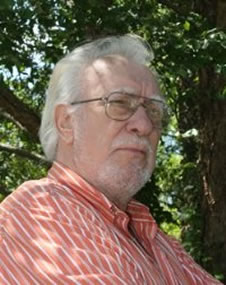
Warren Murphy (New Jersey, 13 september 1933)
De Duitse dichter en schrijver Johannes Poethen werd geboren in Wickrath op 13 september 1928. Zie ook mijn blog van 13 september 2010.
Hol über
3
Aber wozu
nun schon über fünfzig jahr
und immer hinter sappho her
die götter loben nicht
neulust vielleicht
wie es wieder
die glieder regt
doch gewiß
ein lebensmittel.
4
Zahl oder bild
spiegel im spiegel
schwarzes loch mit dir allein
alles fließt
durcheinander
außer uns
bloß dies gedicht
hol über.
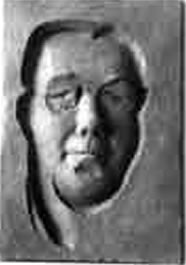
Johannes Poethen (13 september 1928 – 9 mei 2001)
Portret door Eva Zippel
Zie voor nog meer schrijvers van de 13e september ook mijn vorige blog van vandaag.
